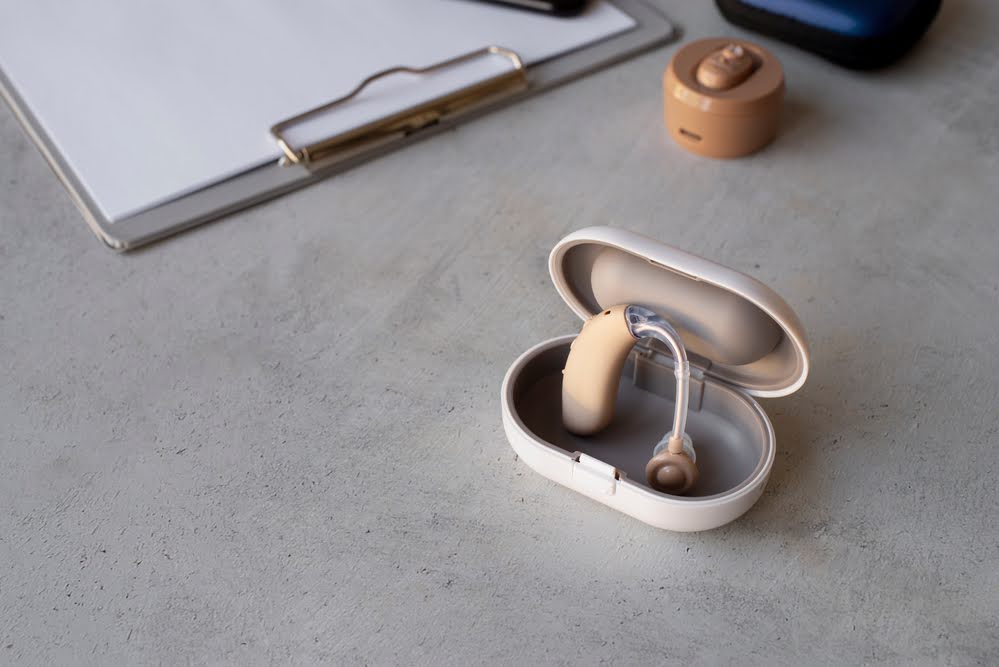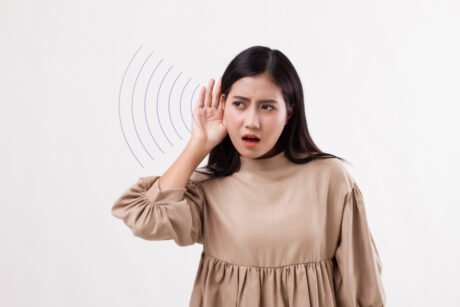Are you considering getting an Over-the-Counter (OTC) hearing aid? For many experiencing hearing loss in Singapore, OTC hearing aids offer a convenient option, readily available off the shelves without the need for prior hearing tests. However, it’s important to understand that they also have disadvantages compared to regular prescription hearing aids.
This article will delve into whether OTC hearing aids truly present a cost-effective solution for your hearing needs in Singapore. Firstly, let’s examine the pros and cons:
| Pros | Cons |
| Affordability compared to prescription hearing aids | Not developed to treat hearing loss with more significance or concerns associated with an injury or underlying medical condition — not recommended for severe to profound hearing loss. |
| Some brands offer adjustments and small evaluations by an audiologist | Self-fitting — not custom fit for your ear. |
| Some come with a smartphone app that adjusts the volume and settings | Typically offers fewer features than prescription hearing aids |
| Wider availability online and in stores makes them easier to obtain | Audiologists cannot provide in-person hearing care after the purchase |
| Can be bought without needing a hearing test or a fitting appointment with an audiologist | Most OTC hearing aids come with shorter warranties vs. prescription hearing aids |
What Are OTC Hearing Aids?
Over-the-Counter (OTC) hearing aids, also known as non-prescription hearing aids, are devices for adults with perceived mild to moderate hearing loss, offering a direct purchase option without needing a prescription. These hearing aids aim to improve hearing by amplifying sounds based on user adjustments or pre-set levels.
In Singapore, those looking to buy OTC hearing aids can typically find them through online marketplaces, and potentially at select local pharmacies or electronics retailers. This accessibility makes exploring hearing aids a more cheap and more immediate option for some.
While you can buy OTC hearing aids without a test, it’s advised for you to undergo a professional hearing assessment. Understanding the specifics of your hearing loss can help you determine if OTC hearing aids are suitable, and whether they address your needs effectively.
How Good Are OTC Hearing Aids?
When considering hearing solutions, it’s natural to wonder how good OTC hearing aids are compared to traditional options. While both aim to improve hearing, OTC and prescription hearing aids differ significantly in several key aspects, such as:
| Feature | OTC Hearing Aids | Prescription Hearing Aids |
| Customisation | Often offers limited user adjustments or pre-set programmes. | Custom-programmed by an audiologist based on any individual’s specific hearing needs. |
| Professional Fitting | Purchased directly by the user without a professional fitting. | Fitted and adjusted by a qualified audiologist to ensure optimal comfort and performance. |
| Support and Aftercare | Typically limited to manufacturer support; no direct audiological care. | Often includes ongoing support, adjustments and maintenance from the dispensing clinic. |
| Sound Quality and Features | May have basic sound processing and fewer advanced features. | Often incorporates sophisticated noise reduction, directional microphones and connectivity features tailored to individual needs. |
OTC Hearing Aids Design vs Prescription Hearing Aids Design
OTC hearing aids are available in various designs, sometimes offering more immediate aesthetic choices. In contrast, prescription hearing aids prioritise a tailored fit, ensuring optimal comfort and functionality based on an individual’s unique ear anatomy.
While OTC hearing aids might present themselves as more stylish hearing aids with a wider array of readily available designs, including smaller and more discreet options, prescription hearing aids offer a significant advantage through their custom-designed fit. This tailored approach is crucial for ensuring all-day comfort and, more importantly, the effective delivery of sound specifically calibrated to individual hearing loss profiles.
How Much Do OTC Hearing Aids Cost in Singapore?
The initial cost of OTC hearing aids is generally lower compared to prescription devices. In Singapore, you can typically find OTC hearing aids ranging from around $200 to $1,000 per pair. However, prescription hearing aid prices in Singapore can range from $1,000 to over $6,000 per pair, depending on the technology and features.
Beyond the upfront hearing aid prices, remember to also factor in potential hidden costs for both types of hearing aids, such as replacement batteries, cleaning and maintenance supplies and possible repair expenses over the long term. For those suffering from severe to profound hearing loss, you can also consider applying for a hearing aid subsidy.
OTC Hearing Aids vs Prescription Hearing Aids: Adjustability and Support
The ways that OTC hearing aids and prescription devices work, as well as the level of support they offer are key differences to consider. Let’s break it down:
- Adjustability: Prescription hearing aids require professional adjustment and fine-tuning by an audiologist to match your specific hearing loss needs. OTC hearing aids, on the other hand, are self-adjustable, often using built-in software or smartphone apps.
- Support: When you choose prescription hearing aids, you receive professional fitting and ongoing support from an audiology specialist. OTC hearing aids typically do not include this personalised, in-person support after your purchase.
- Risks of Misuse: Using the wrong hearing aids — or using them without professional guidance — also carries risks. Incorrect self-adjustment could lead to inadequate amplification, or even potential harm to your remaining hearing.
Can OTC Hearing Aids Replace Prescription Devices?
While OTC hearing aid devices offer an accessible starting point for initial hearing loss, they aren’t a universal solution for everyone. For more significant or intricate cases, the personalised care from an audiologist at a hearing aid centre is crucial.
These professionals use thorough hearing loss tests to precisely tailor prescription hearing aids, a customisation that non-prescription hearing aids can’t match. So, while the cheaper prices of OTC hearing aids might seem appealing, professional assessment often provides more effective, long-term care for various levels of hearing impairment.
Our Takeaway — Should You Choose OTC or Prescription Hearing Aids?

Ultimately, the choice between OTC and prescription hearing aids depends heavily on your individual hearing needs and lifestyle. Here’s a summary to help guide your decision:
- When OTC Hearing Aids Make Sense: If you believe you have only mild hearing loss or are looking for a temporary amplification solution, OTC hearing aid devices might be a convenient starting point. This is due to their accessibility and potentially lower prices.
- When Prescription Hearing Aids Make Sense: For those with more significant hearing impairment or if you value a precise fit, comprehensive support and the expertise of an audiologist, prescription hearing aids are generally a better long-term investment. They offer tailored solutions based on thorough hearing loss tests and ongoing professional care.
If you’re still unsure on which option is right for you, we encourage you to schedule a comprehensive hearing evaluation with our specialists at The Listening Lab. We can assess your needs and recommend the best hearing solutions for your long-term hearing health. To get started, explore our website or contact our customer care team today!
About The Listening Lab
The Listening Lab is a home-grown company dedicated to enhancing our clients’ quality of life by restoring their hearing. Recognising the significant impact of hearing loss, we are committed to offering superior hearing solutions.
Our comprehensive services include thorough hearing tests, effective treatment options, and the prescription of suitable hearing aids. Clients undergo a detailed hearing assessment with us, allowing our specialists to determine if hearing aids are the appropriate solution.
Should hearing aids be recommended, we provide a curated selection of top-tier brands. Each of these products boasts distinct features designed to seamlessly integrate into your daily life, effectively supporting you in thoroughly enjoying your experiences.










